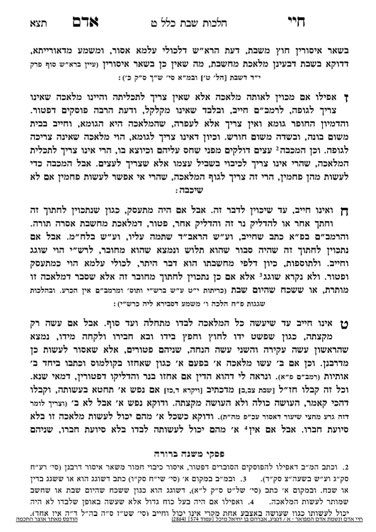We are beginning siman 8, where the Chayei Adam will discuss the concept of misaseik. The classic concept of misaseik would be difficult to apply to hilchos Shabbos, other than as it relates to korbanos. The halacha is that a person is chayav a korban when they transgress an issur on Shabbos b’shogeig, and misaseik is a form of shogeig in which a person is patur from a korban. Practically, a person cannot consider beforehand whether it is muttar to perform a melacha in a misaseik manner, because, by definition, the action would no longer be misaseik, because it would then become deliberate. Nevertheless, there are still some practical applications.
The Chayei Adam writes that the concept of a chiyuv chatas applies when a person performs an assur action intentionally, but were either unaware it was Shabbos, or they forgot it was assur. The action is performed with full awareness and intent, and therefore requires a korban.
If a person is unaware of the action they are performing (e.g., not realizing they are walking with an item in their pocket, and they perform the akira, hanacha and walk through a reshus harabim) it is called misaseik. An action has occurred, but the person has no intent for it. So, as opposed to being osek(doing) in the action, rather it is misaseik (occurring).
The Chayei Adam gives two examples. One is where the person has no intent for the aveirah at all, as we discussed above. The other is where one has intent to perform an aveirah, with full knowledge of the aveirah they wish to perform, and they end up performing a different aveirah. The action is lacking meleches machsheves and therefore, cannot be considered a meizid. It also cannot be considered a shogeig, since he had awareness. The examples the Chayei Adam gives is when a person decided to cut one item (kotzair) and ended up cutting the other, or he wanted to light one candle and ended up lighting a different one. The Chayei Adam clarifies that the Rambam actually holds these cases are chayav, but the Gemara seems to state clearly that they are patur.
If one thought an item was already detached, but did not realize it was actually attached, Tosfos considers this case misaseik, because Tosfos understands that shogeig is only the two cases above, where one had intent for an action and forgot it was assur, or forgot entirely it was Shabbos. Practically, this is relevant after the fact as to whether it is muttar to benefit from the melacha.
Summary
- One is chayav a korban chatas when they perform an assur action intentionally, but were either unaware it was Shabbos, or they forgot it was assur.
- Misaseik is applied when one is unaware of the action they are performing.


